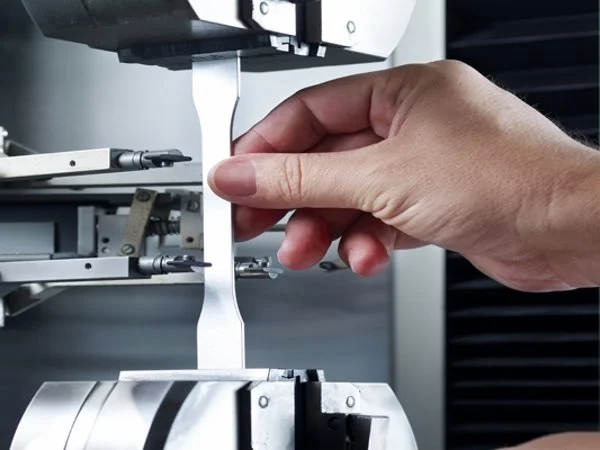EN 10002 Metallic Materials Tensile Strength Test
The EN 10002 tensile strength test is a critical procedure used to evaluate the mechanical properties of metallic materials. This test measures how much force a material can withstand before it breaks, providing essential information for quality assurance and compliance in various sectors including oil & gas.
During this test, specimens are subjected to gradually increasing tension until they fail. The maximum stress at failure is known as the tensile strength. This measurement is crucial for ensuring that materials used in high-stress applications meet stringent safety standards. In the context of oil & gas, where components must endure extreme conditions and pressures, accurate tensile testing ensures reliability and longevity.
The procedure strictly adheres to EN 10028-3:2019 for metallic materials other than steel and iron. It involves precise specimen preparation according to the standard's specifications to ensure that test results are comparable and reliable across different laboratories.
Specimen preparation is a critical step in this process. The type of material, its intended application, and environmental factors influence how specimens are prepared. For instance, materials used in oil & gas pipelines require specimens with specific dimensions to simulate real-world conditions accurately. Proper sample cutting ensures that the test results reflect the true properties of the material.
Once prepared, the specimen undergoes a tensile testing process using high-precision machines equipped with appropriate fixtures and grips. These fixtures ensure that the force is applied uniformly along the length of the specimen. Advanced software controls the rate at which load is increased, allowing for accurate measurement of stress-strain behavior.
The machine records data continuously throughout the test, including strain and stress values. This information allows technicians to plot a stress-strain curve, providing detailed insights into material performance. From this curve, engineers can determine not only tensile strength but also other important properties such as yield strength, elongation, and reduction in area.
The results of the EN 10002 test are essential for quality control processes within manufacturing facilities. By comparing these results against specified limits outlined in relevant standards like EN 10028-3:2019, manufacturers can ensure that their products meet regulatory requirements and customer expectations.
For instance, in the oil & gas industry, where materials must withstand harsh environments including high temperatures and corrosive fluids, accurate tensile testing ensures that selected metals do not compromise safety or operational efficiency. In addition to compliance with international standards, this test helps identify potential weaknesses within material designs early on, facilitating improvements before full-scale production begins.
It is worth noting that while EN 10002 provides a standard approach for tensile testing, specific applications may require adjustments based on particular needs. For example, certain alloys used in offshore platforms might necessitate modified specimen preparation or additional test parameters to account for unique operational conditions.
In summary, the EN 10002 tensile strength test plays a vital role in ensuring the quality and reliability of metallic materials across various industries. Its accuracy is paramount when dealing with critical components like those found in oil & gas infrastructure, where any compromise could lead to severe consequences ranging from operational disruptions to safety hazards.
Industry Applications
| Application Area | Description |
|---|---|
| Petrochemical Plants | Ensures the integrity of pipeline materials and equipment. |
| Offshore Platforms | Evaluates structural components under extreme conditions. |
| Mining Operations | Verifies the durability of mining machinery and tools. |
| Power Plants | Guarantees that turbine blades withstand high stress conditions. |
Quality and Reliability Assurance
- Ensures compliance with international standards like EN 10002-3:2019.
- Provides accurate data for quality control processes in manufacturing facilities.
- Identifies potential weaknesses within material designs early on.
- Aids in selecting appropriate materials based on performance criteria.
International Acceptance and Recognition
The EN 10002 tensile strength test is widely recognized across numerous industries worldwide. Its acceptance in international standards reflects its reliability and consistency, making it a preferred choice for quality assurance purposes.
Many countries adopt these tests because they provide consistent results that can be compared internationally without ambiguity. This uniformity enhances collaboration between manufacturers from different regions who rely on standardized testing methods to ensure interoperability of components across various projects.
The test’s recognition extends beyond Europe, where it was initially developed, into North America and Asia-Pacific regions as well. Industries such as aviation, automotive manufacturing, and construction have incorporated this method into their own quality assurance frameworks due to its proven effectiveness in evaluating materials’ mechanical properties accurately.





